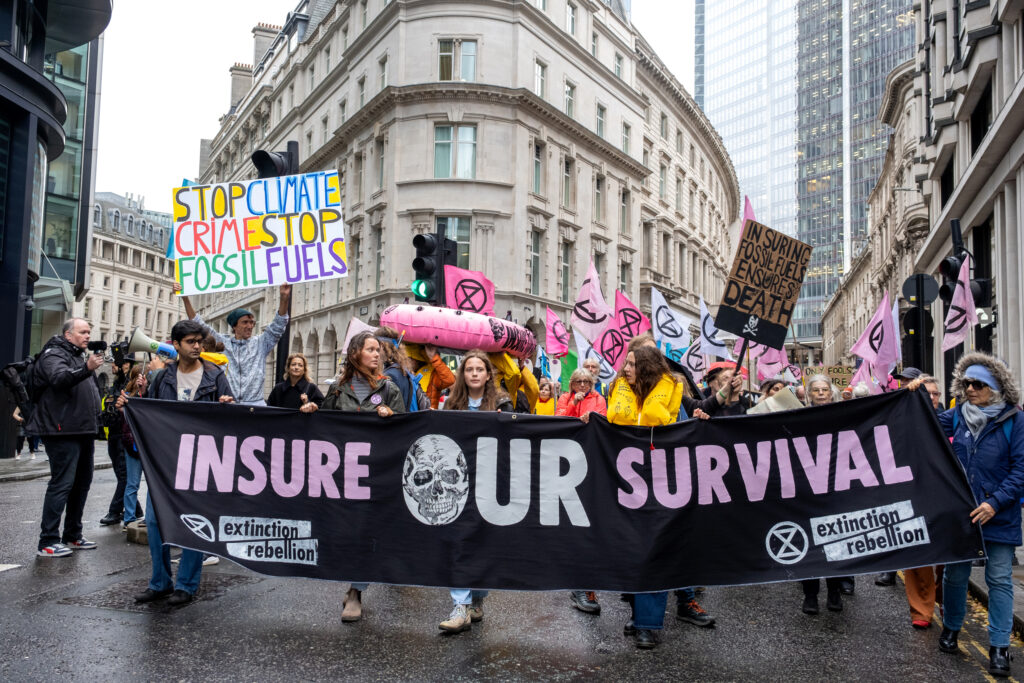LONDON—Hundreds of activists, clad in wetsuits and life vests, marched through London’s financial district, Leadenhall Market, singing a nursery rhyme-themed protest song. “Row, row, row, for life, floods are rising high,” they sang. The event was marked by a bright pink life raft emblazoned with “Insure Our Survival” and slogans like “Stop Climate Crimes, Stop Fossil Fuels.”
The October 28 demonstration, the first of a series by Extinction Rebellion UK, aimed to pressure insurers to halt underwriting new fossil fuel projects. The protest illustrated potential climate crises: global floods, food shortages, and civil unrest exacerbated by population growth and resource scarcity.
This UK campaign follows a global week of action led by the Insure Our Future coalition, emphasizing the critical role of insurance in the financial viability of the fossil fuel industry. Activists identify insurance as a “weak spot” in fossil fuel financing.
Chris Packham, British naturalist, described the insurance industry as the “weak spot in the fossil fuel Death Star” in a promotional video, encouraging action against “oily darkness.” According to Reclaim Finance analyst Ariel Le Bourdonnec, the global spring protests have heightened focus on insurers’ climate crisis roles.

Critics argue that while insurers highlight climate risks and withdraw from vulnerable zones, they still profit from high-emission projects. Extinction Rebellion UK’s Jamie Anderson emphasized that insurers, with significant stakes in the long-term, must resist prioritizing short-term profits.
Recent policy shifts show the influence of activist pressure. Probitas, part of the Lloyd’s of London syndicate, declined insurance for the West Cumbria coal mine and the East African Crude Oil Pipeline. Zurich Insurance Group announced it would stop insuring new oil, gas, and coal projects.
Extinction Rebellion pressured major insurers like AIG and Allianz by demanding public declarations to cease insuring new fossil fuel projects. Only QBE responded, citing existing sustainability commitments without new fossil fuel restrictions. Activist Steve Tooze criticized QBE’s statement as “greenwash” for ignoring emissions from fossil fuel clients.
Despite some progress, activists continue to confront insurers enabling fossil fuel expansion. Insurance firms raise premiums or exit vulnerable areas while maintaining fossil fuel underwriting. Extinction Rebellion’s protests included dramatic demonstrations, targeting insurers’ complicity in environmental degradation.
Progress and Setbacks in Insurance Industry Climate Action
Insure Our Future’s latest report reveals that 46 insurers have stepped back from coal projects, 26 from oil sands, and 19 from Arctic fossil fuel development. Generali recently committed to reducing oil and gas risk insurance, marking a significant industry shift.
However, activists argue that the industry’s progress is insufficient to meet scientific imperatives to limit global warming to 1.5 degrees Celsius. U.S. climate regulation remains limited, but proposals in states like New York aim to link insurance practices with climate risks.
Increased regulatory pressure, especially in Europe, where the European Insurance and Occupational Pensions Authority (EIOPA) recommended more capital for fossil fuel assets, highlights ongoing regulatory evolution.
As climate-related costs rise, activists continue to push for systemic industry changes. Some point to insurers’ profitability from climate disasters as a factor in their reluctance to change underwriting practices. Activist Jamie Anderson warned that the industry’s short-term focus could lead to catastrophic consequences.
Original Story at insideclimatenews.org
